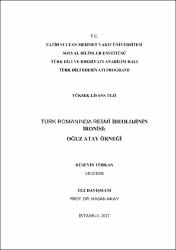Türk romanında resmî ideolojinin ironisi : Oğuz Atay örneği
Citation
TÜRKAN, Hüseyin, Türk romanında resmî ideolojinin ironisi : Oğuz Atay örneği, Fatih Sultan Mehmet Vakıf Üniversitesi Sosyal Bilimler Enstitüsü Türk Dili ve Edebiyatı Anabilim Dalı, Yayımlanmamış Yüksek Lisans Tezi, İstanbul 2017Abstract
Türkiye Cumhuriyeti Devleti’nin ideolojik temellerine inildiğinde, karşımıza, Osmanlı Devleti’nin son döneminde, önce askerî, 19. yüzyıldan itibaren de siyasî, toplumsal ve kültürel alanda etkin rol oynayan Batılılaşma/modernizasyon politikaları çıkar. Ancak, siyasetten sanata, hukuktan eğitime, toplumsal yaşamın dinamiklerinden bireylerin hak ve özgürlüklerine, tarih telakkisinden dil ve kültür sahasına kadar hayatın her alanında köklü değişiklikleri hedefleyen politikaların devletin resmî ideolojisi haline gelmesi, yeni devletin kurulmasından sonra gerçekleşmiştir. Cumhuriyet sonrası Türk romanının en önemli isimlerinden biri kabul edilen Oğuz Atay, romanlarında resmî ideolojinin zihniyet ve uygulamalarını, Türkiye’de yaşanan Batılılaşma/modernizasyon politikalarının siyasî, kültürel, sanatsal ve toplumsal alanda doğurduğu daralma ve yozlaşmayı ironik bir dille ele almıştır. Çalışmamızda, Oğuz Atay romanları resmî ideoloji ironisinin Türk romanındaki güçlü bir örneği olarak ele alınarak incelenmiştir. When tracing back to the ideological bases of the Republic of Turkey, we come across Westernization/modernization politics playing an active role primarily in the military and in the political, social and cultural fields from the 19th century onwards in the last period of the Ottoman State. However, the policies aiming radical changes in all areas of life, from politics to education, from the dynamics of social life to the rights and freedoms of individuals, to the field of language and culture in history became the official ideology of the state only after the establishment of the new state. Oguz Atay, considered as one of the most important names in Turkish novel after the Republic, has dealt with the contraction and corruption of political ideology, politics, art, social and social policies of Westernization/modernization politics in Turkey with an ironic language in his novels. In our work, Oguz Atay novels are considered and examined as a powerful example of the irony of official ideology in the Turkish novel.



















